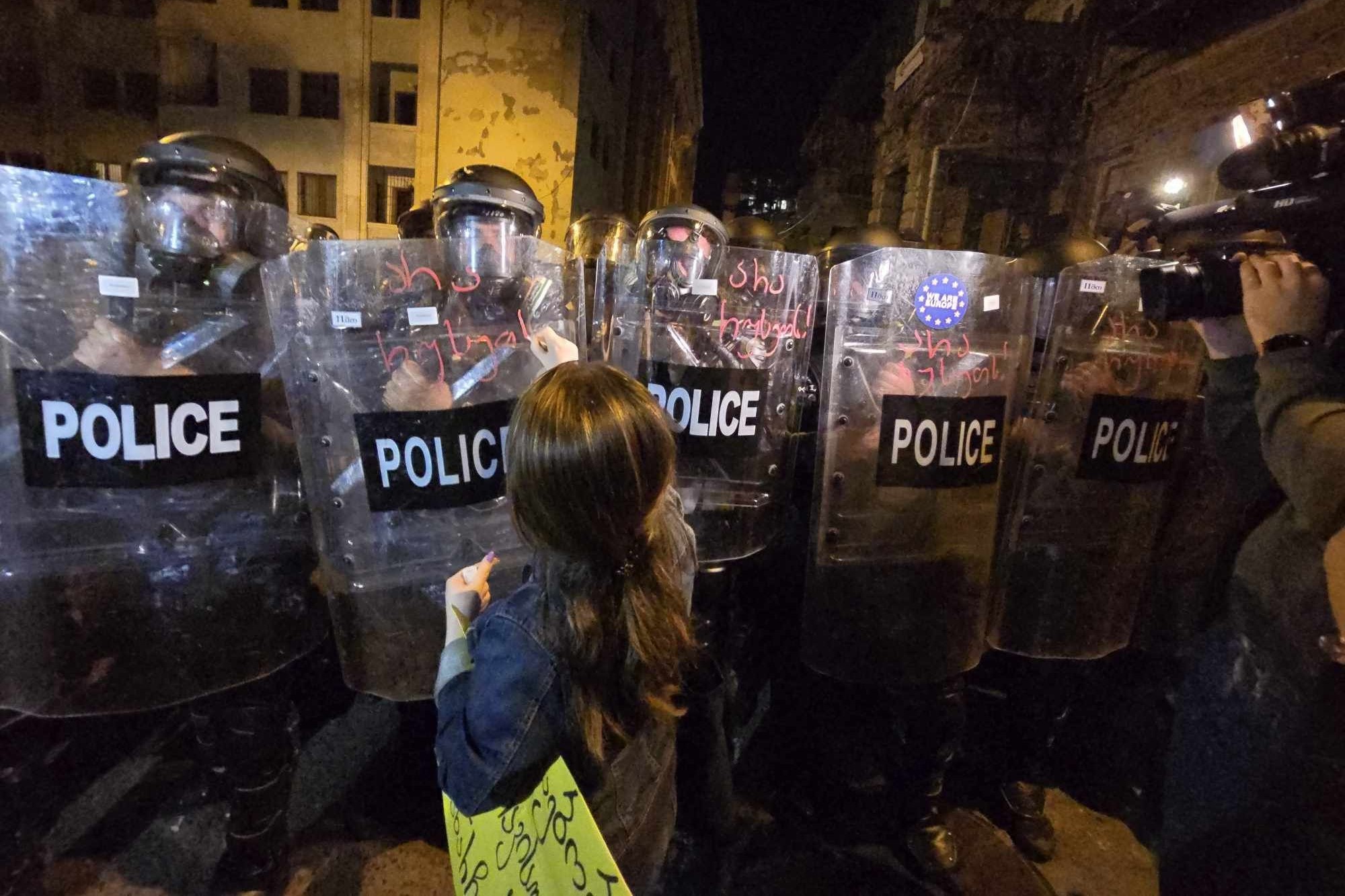
OC Media’s Mariam Nikuradze fined again, reaching a total of more than $7,000
This is the fourth time that Nikuradze has been fined for allegedly blocking streets during a protest.

Georgian police attacked protesters against the draft foreign agent law after the ruling Georgian Dream party postponed the vote on the bill’s first reading.
Riot police attacked the several hundred protesters who remained behind parliament after midnight, after the protests had died down.
Police were seen chasing protesters, beating them, and detaining them, with several journalists also receiving injuries as a result of police attacks.
Riot police have charged protesters without warning, making arrests. OC Media witnessed officers beating and kicking several people as they lay on the ground.
➡️Live updates: https://t.co/ij4HNOYDHR pic.twitter.com/4nP3VmaxUV
— OC Media (@OCMediaorg) April 16, 2024
A journalist from queer news website Aprili told OC Media that he was injured and called a ‘faggot’ after riot police pushed him.
Publika also reported that their journalist Aleksandre Keshelashvili was attacked by police.
Tabula reported that one of their journalists, Giorgi Badridze, was also attacked by riot police. They said the police took away his personal phone, after which Badridze continued to use an office phone, which riot police also tried to take away but returned to him.
Parliamentary speaker Shalva Papuashvili announced that the first vote on the bill was being delayed as the debate continued late into Tuesday evening.
The second day of protests against the draft law began in the afternoon, with tens of thousands gathering in front of parliament in Tbilisi later that evening. The protest was marked by standoffs between the police and protesters behind parliament, where protesters attempted to block the building’s entrances to prevent MPs from leaving parliament.
Behind parliament, riot police deployed pepper spray to disperse and push back protesters to sidestreets and alleyways around the building.
The Ministry of Internal Affairs stated that 11 people were arrested on Tuesday night and that one police officer was injured in the protest. At least 25 have been detained since the start of the protests on Monday, while the Interior Ministry said two police officers were injured.
Also on Tuesday, a lawyer representing four of those arrested on Monday, Lasha Tkesheladze, told IPN that his clients had sustained injuries after police physically assaulted them.
‘When they were brought into the isolation cell, they were examined, and there is an official document stating these people have injuries’, the lawyer said.
Late on Tuesday night, IPN reported that President Salome Zourabichvili appealed to French President Emmanuel Macron and European Council President Charles Michel to discuss the current political crisis in Georgia at the Special European Council planned for 17–18 April. Earlier in the day, she condemned the government for pursuing the foreign agent bill, calling it a ‘Russian strategy of destabilisation’.
Michel had earlier posted on X that Georgian Dream’s foreign agent bill was inconsistent with ‘Georgia’s EU aspirations and its accession trajectory’ and would distance Georgia from the EU.
The Georgian people have chosen the European path and in response, the European Council granted #Georgia the candidate status last December.
Let me be clear: the draft Law on Transparency of Foreign Influence is not consistent with Georgia’s EU aspiration and its accession…
— Charles Michel (@CharlesMichel) April 16, 2024
Journalists from online media were once again barred from covering the parliament’s discussion of the bill, with Papuashvili claiming that they only wanted to enter parliament to protest rather than to report on the discussion of the bill.
‘It is a violation of journalistic ethics when you use accreditation, enter the building, and instead of your activity, you state your civic or other position’, Papuashvili told TV reporters.
A Facebook page linked to the ruling party also attacked OC Media’s coverage of the draft foreign agent law on Tuesday. The post included an image of OC Media editor-in-chief, Robin Fabbro, with the words ‘inciter of violence’ stamped across it.
If the bill passes its first reading in parliament on Wednesday, it will have to go through two more readings. President Zourabichvili will then have the opportunity to veto the law, after which parliament can vote to override this.
The Social Justice Center’s director for democracy and justice, Guram Imnadze, told OC Media on Tuesday that the process could be lengthy.
He said readings could only occur once every other week in Parliament.
‘The earliest date for the enactment of the draft is early June. But if Georgian Dream decides, they can prolong the discussions around the draft and finalise it in the autumn’, said Imnadze.
Asked about yesterday’s Legal Affairs Committee hearings, Imnadze said that civil society organisations were allowed to attend the meeting in ‘limited numbers’, while ‘regional [media organisations] were banned from the hearing, while they are directly affected by the draft’.
Imnadze added that the committee hearing was rife with ‘provocations and verbal attacks’, and that MPs from the ruling party had ignored questions posed by representatives of civil society organisations about the bill.
Georgian Dream announced they were bringing the bill back on 3 April, a year after being forced to drop it amidst mass street protests. At the time, the government promised not to revive the law.
Georgia’s foreign agent law would label any civil society or media organisation that received at least 20% of its funding from outside Georgia ‘organisations carrying out the interests of a foreign power’. Such organisations would be subject to ‘monitoring’ by the Ministry of Justice every six months, which lawyers have warned could include forcing them to hand over internal communications and confidential sources. Organisations that do not comply would be subject to large fines.
The law has been dubbed the ‘Russian Law’ by critics in Georgia due to its similarity to legislation used to crush civil society and independent media in Russia.